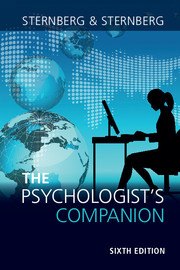 The Psychologist's Companion
The Psychologist's Companion Book contents
- Frontmatter
- Contents
- Preface
- Acknowledgments
- Introduction
- Part I Macro-Challenges in Writing Papers: Planning and Formulating Papers
- Part II Micro-Challenges in Writing Papers: Presenting Your Ideas in Writing
- 7 A Word about Content, Language, and Style
- 8 Commonly Misused Words
- 9 American Psychological Association Guidelines for Psychology Papers
- 10 Guidelines for Data Presentation
- Part III Writing and Preparing Articles for Journal Submission
- Part IV Presenting Yourself to Others
- Epilogue
- References
- Index
8 - Commonly Misused Words
from Part II - Micro-Challenges in Writing Papers: Presenting Your Ideas in Writing
Published online by Cambridge University Press: 24 November 2016
- Frontmatter
- Contents
- Preface
- Acknowledgments
- Introduction
- Part I Macro-Challenges in Writing Papers: Planning and Formulating Papers
- Part II Micro-Challenges in Writing Papers: Presenting Your Ideas in Writing
- 7 A Word about Content, Language, and Style
- 8 Commonly Misused Words
- 9 American Psychological Association Guidelines for Psychology Papers
- 10 Guidelines for Data Presentation
- Part III Writing and Preparing Articles for Journal Submission
- Part IV Presenting Yourself to Others
- Epilogue
- References
- Index
Summary
This chapter explains the meanings of some of the most commonly misused words in student papers. The chapter is divided into two parts. The first part deals with meanings of nontechnical terms. Dowling (2008) provides an extensive overview of misused words, and Garner (2009) provides a complete dictionary of American usage. The second part of the chapter deals with meanings of technical terms. The psychological dictionaries and encyclopedias described in Chapter 3 provide much more extensive lists of psychological terms.
NONTECHNICAL TERMS
1.adapt, adopt. To adapt is to accommodate, to adjust, to bring into correspondence. To adopt is to embrace, to take on, to make one's own.
a. Organisms adapt to their environment.
b. Children adopt the attitudes of their peers.
2.adopt. See (1).
3.affect, effect. Both words can be used either as nouns or as verbs. An affect is an emotion or something that tends to arouse an emotion. An effect is a result or outcome of some cause. To affect is to influence or to have an effect on something. To effect is to accomplish or to bring about.
a. His display of affect in response to the TAT (Thematic Apperception Test) picture seemed artificial and contrived to gain the psychologist's sympathy.
b. The effect of the experimental treatment was negligible.
c. Shoddy procedures affect the outcome of an experiment.
d. She was able to effect a change in behavior by desensitizing the patient to snakes.
4.aggravate, irritate. To aggravate is to intensify, to heighten, or to magnify. To irritate is to annoy, to inflame, to provoke.
a. Don't aggravate his frustration by telling him that he answered all the questions incorrectly.
b. Experimenters who deceive subjects often irritate the subjects.
5.allusion. An allusion is an indirect reference. An explicit statement about X is not an allusion to X.
a. The first experimenter made an allusion to a reward for exceptional performance, but she never came out and directly told the subject that the subject would receive a reward.
b. The second experimenter told the subject he would receive a reward for exceptional performance. (He did not allude to a reward.)
6.among, between. Between refers to a relation between two things and among refers to a relation among more than two things.
- Type
- Chapter
- Information
- The Psychologist's CompanionA Guide to Professional Success for Students, Teachers, and Researchers, pp. 173 - 195Publisher: Cambridge University PressPrint publication year: 2016


